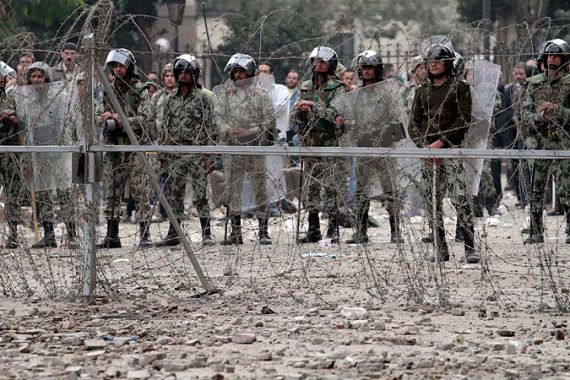UN condemns Egyptian military’s violence
Ban Ki-Moon calls for soldiers to respect right to peaceful protest, and to halt excessive use of force.

Egyptian soldiers have clashed with hundreds of protesters for a fourth straight day, pelting each other with stones in the heart of the capital, Cairo.
As the violence continued, Ban Ki-moon, the UN general-secretary, on Monday condemned excessive use of force by Egypt’s security forces.
Ban Ki-moon “is highly alarmed by the excessive use of force employed by the security forces against protesters, and calls for the transitional authorities to act with restraint and uphold human rights, including the right to peaceful protest,” his office said in a statement.
Police and soldiers using batons again drove stone-throwing protesters out of Cairo’s Tahrir Square, hub of the uprising that ousted Hosni Mubarak in February, early on Monday.
Protesters fled down sidestreets, away from sensitive areas where parliament, the cabinet offices and Interior Ministry are located.
Hillary Clinton, the US secretary of state, said she was “deeply concerned” about the violence in Egypt and urged the security forces “to respect and protect the universal rights of all Egyptians.”
In a statement, she also urged protesters “to refrain from acts of violence.”
Al Jazeera’s Sherine Tadros, reporting from Cairo on Sunday, described the scene at Tahrir Square, where fighting raged the day before, as “pretty calm”, but said clashes continued to erupt near the parliament building.
“What the military have essentially done is created a concrete barrier to block the enterance into that street to stop the protesters coming from Tahrir Square and continuing with their sit in,” she said.
“The protesters, of course, not happy with the situation. They’re telling us they have a right to peacefully demonstrate in front of a government building.
“The skirmishes are taking place … across that concrete wall between the military and the protesters.”
The violence began on Friday when one of several hundred peaceful protesters staging a sit-in outside the parliament building was reportedly detained and beaten by troops.
Continuous fighting since then has left at least 10 people dead and 432 others injured, reported Egypt’s health ministry.
Troops in riot gear have been filmed in recent days beating protesters with long sticks after they had fallen to the ground. Video and photos showing two soldiers dragging a woman lying on the ground by her shirt exposing her underwear, and stomping on her body, have caused particular outrage amongst the military’s critics.
The recent violence followed a second round of voting in Egypt’s first free elections in decades and is the most sustained crackdown yet on anti-government demonstrations.
Egypt’s ruling generals appear confident that Islamist parties who swept recent elections will stay out of the fight while other pro-democracy protesters become increasingly isolated.
‘Real violence’
Soldiers with guns and batons charged into Tahrir Square on Saturday and beat protesters in a violent display of force.
The soldiers cleared the area as thick black smoke filled the skies following the eruption of a fire in the area around Egypt’s upper house of parliament.
Al Jazeera also filmed exclusive footage of what appeared to be a soldier, in a line of charging troops, drawing a pistol and firing shots at a group of retreating protesters.
“[These are] very nasty and such ugly scenes that we have witnessed for ourselves in downtown Cairo,” said Al Jazeera’s Sherine Tadros, reporting from the capital.
“This is real violence that we have seen against the protesters, unarmed protesters being beaten by the military police and the soldiers.”
Military police openly beat women protesters in the street, slapped elders on the face, and pulled the shirt off of at least one veiled woman as she struggled on the pavement. Witnesses told the AP news agency that soldiers beat and gave electric shocks to men and women dragged into detention, many of them held in the nearby parliament buildings.
Earlier, Tahrir Square and streets leading to the nearby parliament and cabinet headquarters resembled war zones. The military set up concrete walls between the square and parliament, but clashes continued.
‘Counter-revolution’
Egypt’s prime minister, Kamal el-Ganzouri, addressed the violence at a news conference on Saturday, branding the protesters as counter-revolutionaries, and saying the fighting was an attack on the country’s revolution.
“This is not a revolution, but a counter-revolution,” he said. “Those who are in Tahrir Square are not the youth of the revolution.”
He added that his government would not confront peaceful demonstrations with any force, but he said protesters “threw rocks and destroyed everything they came across”.
Al Jazeera’s Rawya Rageh, who was at the press conference, said the “prime minister’s promises have fallen flat, after the escalation of violence after his message”.
Over the weekend, nine members of a civilian council set up in November to advise the military after anti-army demonstrations resigned in protest against the military action.
The violence highlights tensions in Egypt 10 months after a popular revolt toppled President Hosni Mubarak. The army generals who replaced him have angered some Egyptians by seeming reluctant to give up power.